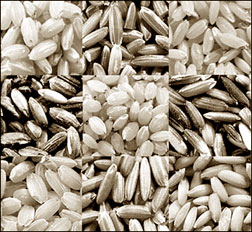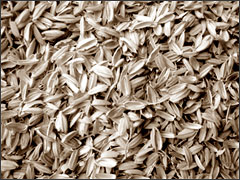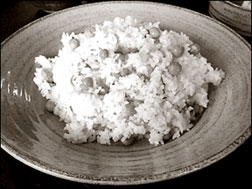The food crisis - a way out
by Lloyd F Yapa
A food crisis is upon us in this country- without warning? No, not at
all.
In true Sri Lankan style we seem to blame it all on external
circumstances like the depreciation of the US $, higher consumption in
countries such as India and China due to their rising prosperity, the
trend towards use of grain in the manufacture of ethanol as a substitute
for petroleum, the price of which is sky rocketing and global warming.
 We do not realize that the crisis here has been gathering momentum in
this country during the last 50 years or so due to the mismanagement of
the economy in general and of agriculture in particular by our
politicians in collusion with policy makers. We do not realize that the crisis here has been gathering momentum in
this country during the last 50 years or so due to the mismanagement of
the economy in general and of agriculture in particular by our
politicians in collusion with policy makers.
The policy followed by the country with regard to rural agriculture
during the last few decades has failed. This is the main reason for the
crisis and the persistence of high poverty (and malnutrition) levels
especially in the Uva, Central and the Eastern provinces as well as the
war ravaged and tsunami hit areas of the country.
Objective
The prime objective of our policy with regard to rice production (and
agriculture) has been self sufficiency; higher productivity, an adequate
return to the farmer or his wellbeing have always come second or way
below.
 In other words policy attributes like the Guaranteed Price Scheme
(GPS) and compulsion to grow paddy only in irrigated lands have tended
to ensure for the pampered voter/consumer his staple at a low price and
not a fair return for the farmer who has been extended some mercies like
the fertilizer subsidy with a good dose of bribery and corruption by
officials and politicians. In other words policy attributes like the Guaranteed Price Scheme
(GPS) and compulsion to grow paddy only in irrigated lands have tended
to ensure for the pampered voter/consumer his staple at a low price and
not a fair return for the farmer who has been extended some mercies like
the fertilizer subsidy with a good dose of bribery and corruption by
officials and politicians.
This has been made worse by right royal rips off by input suppliers
and monopolistic millers hiding behind selfish politicians.
The demonstrated ability of the principle of large scale production
to reduce costs, as well as that of the price mechanism and markets
determined by supply and demand to ensure a fair price both for the
farmer and the consumer - most of the time, when there is no market
failure have been ignored.
In addition neglect in the provision of extension services and
interference with the market by an incompetent bureaucracy guided by
semi literate politicians have ensured government failure in the form of
low returns and poverty for the farmer and ultimately a food crisis for
all consumers in the country.
Inertia
It is not only the officials and the politicians who are responsible
for the crisis. Professionals who should know better have been watching
the worsening crisis from the side lines with intellectual inertia.
In fact at a seminar on the subject held recently, a leading
professional presiding over the meeting declared with simplistic
pomposity that the best solution is to ban the import of all food items
as ‘even a broom stick planted on this blessed soil will take sprout’-
meaning that scarcity will compel everybody in this country, to produce
enough food!
 He and others present substantiated the statement by saying the
country was the granary of the East in ancient times, (meaning why can’t
it be done now?). He and others present substantiated the statement by saying the
country was the granary of the East in ancient times, (meaning why can’t
it be done now?).
They ignored the arguments of a person from the audience, who tried
to explain that the best course of action, in this day and age, to
produce enough food was for the state to think in terms of ensuring a
remunerative return for the farmers, while encouraging large scale
production and enforcing competition as well as innovation among them,
intervening only to support the market mechanism to work smoothly,
strengthen infrastructure and to cushion the poor from market failure.
Way out
Let us try to elaborate on this line of thinking. First if there is a
food crisis, the country has to arrive at a short term solution, (as
hungry mobs will not wait for time consuming permanent solutions).
The logical short term action is to induce farmers to increase the
acreage under paddy by offering better prices/returns, a good extension
service and water for irrigation.
In addition home gardening to produce other food varieties can be
encouraged by providing quality planting material and, an efficient
extension service; (no, not by banning the import of all food items).
 Government agencies can also maintain buffer stocks of essential food
items like rice to be released to the market when prices shoot up; but
this needs careful planning and monitoring of supply and demand
conditions. Government agencies can also maintain buffer stocks of essential food
items like rice to be released to the market when prices shoot up; but
this needs careful planning and monitoring of supply and demand
conditions.
Study the value chain - remove the kinks
Permanent solutions require medium to long term action. For this
purpose study the value chain in respect of food production - from input
supplies to primary production to storage, processing, distribution and
marketing - wholesale and retail trade and remove the kinks.
The first of these kinks may be that around 80% of the rice farms are
less than an acre in size - too small to be viable as paddy cultivation
is essentially a large scale operation.
Therefore introduce land reform (first on a pilot scale) i.e. give
ownership (and clear titles) of the land to farmers to enable those who
find themselves making losses, to sell the land to others so that farms
of a larger size can emerge.
Fortunately this is not a difficult task since over 80% of the land
is owned by the state. If there is a fear that most farmers will sell
their land and join the queues of the unemployed, encourage farmers to
form corporate bodies like joint stock companies; in order to gain
economies of scale.
Such companies should control a large area (preferably a
geographically and socially uniform area of about 4000 acres).
They should not be compelled to grow un-remunerative crops; if
growing paddy is not profitable, careful planning and incentives (for
growing and processing on a large scale and differentiation of products
to earn high prices) can be used to make it remunerative.
In any case, the state has to support these companies until they can
stand on their own feet, like other well-run businesses in the country.
Infrastructure and services
Then provide the rural areas with infrastructure facilities like well
maintained roads irrigation works, electricity and services like credit
on reasonable terms, an efficient extension service, transport, storage,
milling and marketing facilities.
At the present time government agencies (both central and local) tend
to spend very little on maintenance of infrastructure facilities not
only due to scarcity of funds but also due to over spending on
unproductive vote catching welfare programmes and on corruptible (large)
projects.
Widespread corruption with regard to award of maintenance of
contracts leading to low quality repairs has also to be eliminated. (At
present 30-40% of perishables transported is reported to be lost due to
absence of packaging and poor road conditions)
Provision of inputs like seed, planting material, chemicals,
extension services as well as milling and marketing by the private
sector should be regulated to maintain quality, reduce costs/prices and
prevent the sale of harmful substances.
This is the responsibility of state agencies although it does not
mean that they should take over such services; at present officialdom is
too incompetent and inefficient to do so due to the politicization; that
is why introduction of good governance, especially separation of powers
among the legislature, the executive and the judiciary (through the
implementation of the 17th Amendment) to eliminate politicization of the
public service (and the courts) is essential.
Money lenders with their usurious practices still hold sway in rural
areas. Sri Lankan banks should therefore be roused from their slumber to
spread out into the rural areas and develop schemes to lend on
collective guarantees of groups of creditors like the ‘grammeen’ banks
of Bangladesh since the poor do not posses assets of high value.
Currently milling of paddy is reported to be a monopoly in the hands
of a couple of tycoons with political backing enabling them to dictate
the selling prices of rice.
For open markets to function smoothly to deliver a fair price to the
producer and sell a product to the consumer at the lowest possible
price, competition among suppliers (as well as buyers) has to be
enforced by law.
Such pressures will induce producers/suppliers to reduce costs and
sell the produce at the lowest possible price so that they could win the
largest possible market share. They will also at the same time be
pressured to innovate to differentiate the products e.g. by increasing
quality and packaging to secure a premium price, thereby increasing
their profit margins.
This is why competition policies including anti trust/monopoly
legislation (plus innovation policies) have to be enforced with
impartiality, (for which good governance has to be practiced as stated
earlier).
Marketing
Now let us take up the question of marketing of farm produce. Earlier
we stated that a smoothly functioning open market could ensure that the
produce is sold at a fair price to the consumer and the required
quantities are produced (the state will of course have to keep up a
vigil to ensure that consumers are not exploited in any manner and that
there is fair competition among the suppliers by appointing a
regulator).
In fact it is now reported that farmers are increasing the area under
paddy in response to the prevailing high price of rice. What is implied
here is that there need not be a rigid instrument like the GPS for this
purpose; no one can divine the right price at which the demand can be
met and a fair return is ensured for the farmer; only an efficiently
functioning market can meet the challenge; if the price is too low and
hardly meets the cost of production, the farmer will not be motivated to
produce and supply a higher quantity of a better quality.
However, marketing is not a mere matter of supply and demand only;
products should conform to the needs of consumers, be delivered at the
right time and at the right place by informing the consumers how much
and what and where it is available and what price.
This is where information and promotion come in along with branding
to satisfy customer preferences, to secure premium prices. This cannot
be delivered by officialdom even if they are efficient and honest.
It is obvious that farmers with small holdings too cannot deal with
such a process due to paucity of resources and expertise.
Joint stock companies
The joint stock companies that we referred to earlier could be vested
with this responsibility as they would be in a position to secure the
required inputs for the purpose such as credit, the expertise, the
equipment and other assets, being large corporate bodies recognized
especially by banks. They will even be able to undertake the milling of
paddy and other types of processing as well.
Product oriented urban clusters
Since they cannot be expected to undertake all the operations in the
value chain concerned another instrument has to be devised and that is
the urban cluster or township consisting of other enterprises dealing
with various services ranging from research, extension, ploughing,
transport, storage, milling/processing, packaging, wholesaling and
retailing.
This is in line with the concept of integrating the vertical
functions in the value chain from supply to production, distribution and
marketing to reduce costs practised by the Japanese companies like
Toyota.
For this purpose the rural areas have to be divided into large
geographic zones where certain crops which can earn the highest possible
margins could be cultivated on a large scale.
A town in the centre of the region will have to be developed to
service the production in the zone.
For example if the area around Ampara is best suited for paddy
production, Ampara town can be developed as a service cluster/centre,
the planning and the provision of infrastructure of which is the
responsibility of the state; the private sector could be incentivised to
undertake the rest of the work/services required.
The whole system could be commenced as a pilot project so that the
experience required for extending the idea to the rest of the country
could be acquired.
Benefits from clusters
Product oriented urban clusters will not only provide the
sophisticated services required by the primary producers but also will
extend the concept of large scale production to reduce costs.
They will also provide employment to those exiting agriculture due to
various reasons. Thus it will increase the productivity of agriculture
as well; currently it is quite low due to the high man/land ratio of the
sector (as high as 31% of the labour force).
Above all, such an approach to development will increase the incomes
of rural populations. Higher rural incomes will increase the demand for
various industrial goods and services.
The already developed areas like the Western Province will respond by
producing more goods and services. Sri Lanka’s economy will then begin
to grow faster especially if an appropriate policy mix to ensure stable
economic policies and open markets (supported by good governance and
peace) is introduced along with strategic planning to suit changing
conditions.
If the state could at the same time introduce measures to ensure an
equitable distribution of incomes as well as opportunities for upward
mobility (like quality tertiary education), poverty levels could also be
slashed. |
